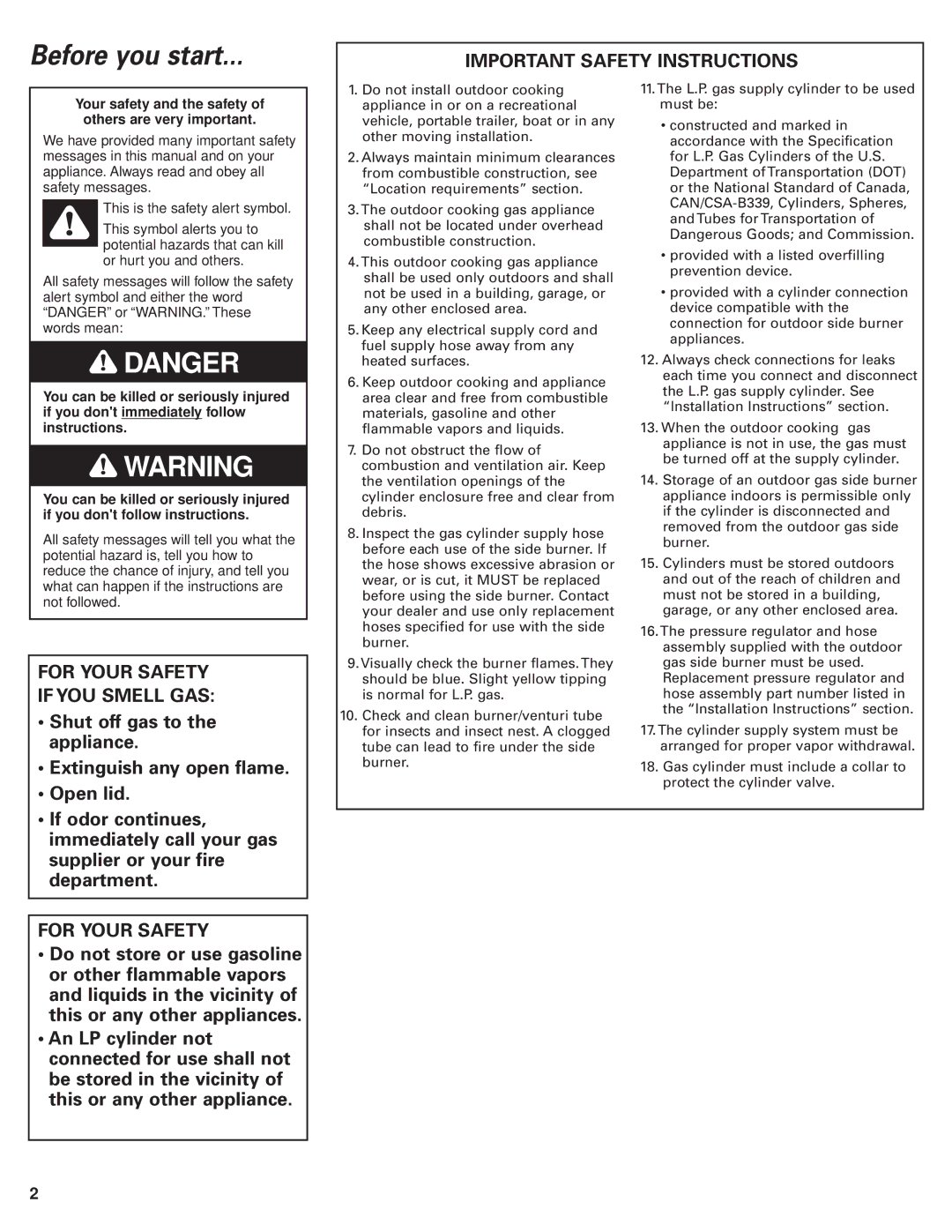
Before you start...
IMPORTANT SAFETY INSTRUCTIONS
Your safety and the safety of others are very important.
We have provided many important safety messages in this manual and on your appliance. Always read and obey all safety messages.
This is the safety alert symbol.
This symbol alerts you to potential hazards that can kill or hurt you and others.
All safety messages will follow the safety alert symbol and either the word “DANGER” or “WARNING.” These words mean:
![]() DANGER
DANGER
You can be killed or seriously injured if you don'timmediately follow instructions.
![]() WARNING
WARNING
You can be killed or seriously injured if you don't follow instructions.
All safety messages will tell you what the potential hazard is, tell you how to reduce the chance of injury, and tell you what can happen if the instructions are not followed.
FOR YOUR SAFETY
IF YOU SMELL GAS:
•Shut off gas to the appliance.
•Extinguish any open flame.
•Open lid.
•If odor continues, immediately call your gas supplier or your fire department.
FOR YOUR SAFETY
•Do not store or use gasoline or other flammable vapors and liquids in the vicinity of this or any other appliances.
•An LP cylinder not connected for use shall not be stored in the vicinity of this or any other appliance.
1.Do not install outdoor cooking appliance in or on a recreational vehicle, portable trailer, boat or in any other moving installation.
2.Always maintain minimum clearances from combustible construction, see “Location requirements” section.
3.The outdoor cooking gas appliance shall not be located under overhead combustible construction.
4.This outdoor cooking gas appliance shall be used only outdoors and shall not be used in a building, garage, or any other enclosed area.
5.Keep any electrical supply cord and fuel supply hose away from any heated surfaces.
6.Keep outdoor cooking and appliance area clear and free from combustible materials, gasoline and other flammable vapors and liquids.
7.Do not obstruct the flow of combustion and ventilation air. Keep the ventilation openings of the cylinder enclosure free and clear from debris.
8.Inspect the gas cylinder supply hose before each use of the side burner. If the hose shows excessive abrasion or wear, or is cut, it MUST be replaced before using the side burner. Contact your dealer and use only replacement hoses specified for use with the side burner.
9.Visually check the burner flames. They should be blue. Slight yellow tipping is normal for L.P. gas.
10.Check and clean burner/venturi tube for insects and insect nest. A clogged tube can lead to fire under the side burner.
11.The L.P. gas supply cylinder to be used must be:
•constructed and marked in accordance with the Specification for L.P. Gas Cylinders of the U.S. Department of Transportation (DOT) or the National Standard of Canada,
•provided with a listed overfilling prevention device.
•provided with a cylinder connection device compatible with the connection for outdoor side burner appliances.
12.Always check connections for leaks each time you connect and disconnect the L.P. gas supply cylinder. See “Installation Instructions” section.
13.When the outdoor cooking gas appliance is not in use, the gas must be turned off at the supply cylinder.
14.Storage of an outdoor gas side burner appliance indoors is permissible only if the cylinder is disconnected and removed from the outdoor gas side burner.
15.Cylinders must be stored outdoors and out of the reach of children and must not be stored in a building, garage, or any other enclosed area.
16.The pressure regulator and hose assembly supplied with the outdoor gas side burner must be used. Replacement pressure regulator and hose assembly part number listed in the “Installation Instructions” section.
17.The cylinder supply system must be arranged for proper vapor withdrawal.
18.Gas cylinder must include a collar to protect the cylinder valve.
2
